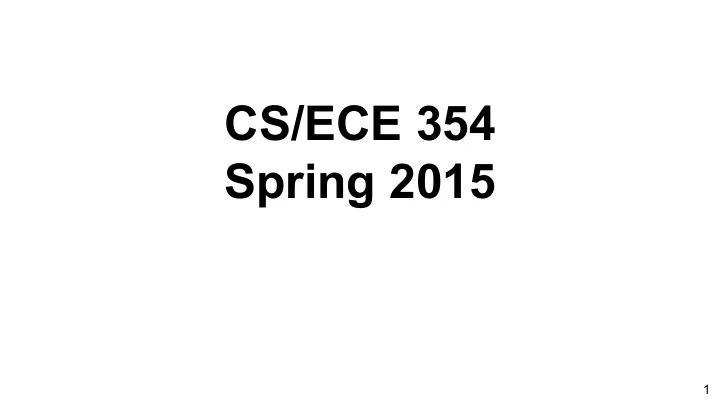

CS/ECE 354 Spring 2015 1
Karen Miller http://pages.cs.wisc.edu/cs354-1 smoler@cs.wisc.edu office phone: 608-263-1724 4283 CS 2
Karen's background ● BS EECS at Berkeley ● Worked at Astronautics Corp. of America doing HW design the memory system of the ZS 1 (mini supercomputer) ● MS CS here at UW Madison ● Many semesters teaching ● Many years with the HTCondor project 3
Course Goals ● learn about computer architecture ● see more of the big picture of how computers work, in both the HW and SW ● become a C programmer ● be introduced to many aspects of operating systems 4
Course Grades ● Standard UW grades: A, AB, B, BC, etc. ● 90% of available points will be an A ● Course grade based on 30% assignments 20% exam 1 25% exam 2 25% exam 3 ( Friday May 15, 7:45 am ) 5
10 6
Schedule (from the course web page) Dates Topics - the subject and links to lecture slides Readings - from the textbook, written by Karen, from K&R, outside materials On Your Own - you are responsible for learning these topics, but they will not be covered in lecture Beyond 354 - material of interest, but not part of the course Due Dates 7
Lecture Slides ( always provided) ● reduce note-taking time ● are incomplete ● do not substitute for attending lecture 8
Assignments 5 graded assignments ● most are programs ● work alone or in a pair ● grading is picky Karen's advice: start assignments early 9
Computer Systems: A Programmer's textbook Perspective, by Bryant and O'Hallaron, second edition And, obtain a reference manual for programming in C. Online references might be enough. Preferred reference: The C Programming Language by Kernighan and Ritchie (K & R), second edition 10
Use all your resources: Come to class (you are responsible for all YOU CAN GET AN A ! class material). Know the prerequisite material. Learn the On Your Own subjects. Form a study group. Do the assignments ! Use the lecture slides. Do the readings. Ask questions in office hours (both Karen's and the TAs'). 11
Course Topics ● A common HLL: C ● x86 assembly language ● arrays, stacks, and queues ● implementing functions ● I/O, including exception handling (interrupts and traps) ● memory hierarchies and caching ● virtual memory ● linking and loading ● networks and network programming (maybe) 12
Recommend
More recommend